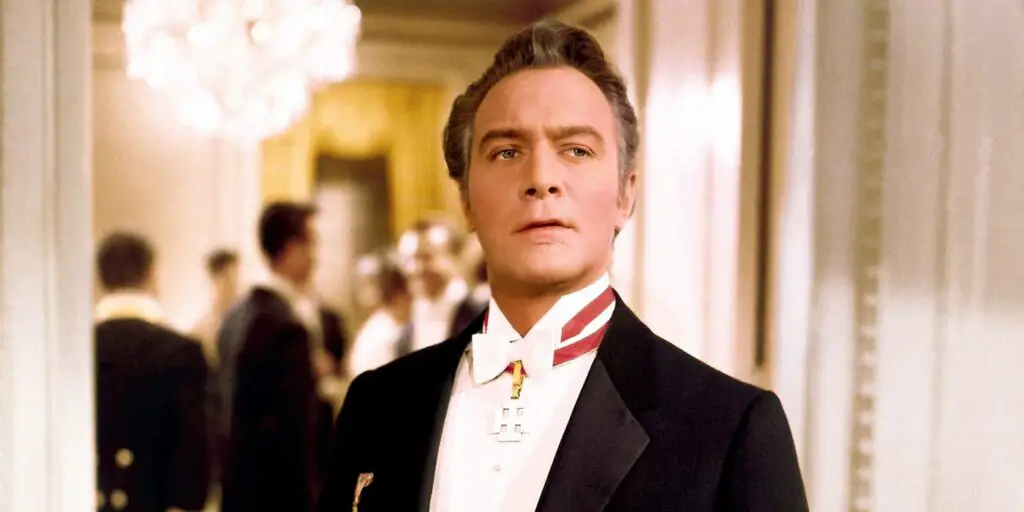“The hills are alive with the sound of music.” But with one less beautiful voice. Actor Christopher Plummer, who brilliantly played Captain von Trapp (aka “Austria’s awesomest Nazi-fighting musical dad ever!”) in The Sound of Music (1965) passed away early this month. He was 91 years old. February is a sad month, and the world heaves a collective sigh.
Often described as the greatest Hollywood musical of all time, The Sound of Music won five Academy Awards – including Best Picture. It rocked the 1960s box office, inspired “sing-along” tours in the film’s setting of Salzburg, Austria – and has become a treasured classic on TV screens everywhere. The Sound of Music made you laugh, cry, and sing!
A story about a spunky nun-in-training called Maria (enter actress Julie Andrews), who gets sent away from the abbey due to her spunky ways, and winds up governess to seven children (gulp!), and then falls in love with their strict, handsome, wealthy widower dad called Captain von Trapp (enter Christopher Plummer), The Sound of Music takes you on an emotional rollercoaster. This film unpacks a lot! At 174 minutes (nearly three hours), this movie is a sparkling melodious juggernaut, and its success can be attributed to many factors – including the great Christopher Plummer.
Recommended: 100 Best Hollywood Movies Of All Time
Just like those magnificent snow-tipped Alps Mountains of Salzburg, Austria, Christopher Plummer shines in The Sound of Music. His Captain von Trapp (first name, Georg) is complex – at times unlikeable (until you understand the depth of his widower pain), then at times tender (when you witness his growing love for Maria).
There’s a welcome mystery to Georg. He comes onto the screen as a scowling sea-captain dictator – wholly opposite to his serenely beautiful, lavish home. Maria is endearing, though unsuccessful in disarming Captain von Trapp.
Unfortunately, her playful “Yes, sir” military salute does nothing to break that clichéd conversational ice. These two appear as foes from the outset. How will they ever fall in love?
Though a relative newbie to 1960s Hollywood, Christopher Plummer was already showing a daring flair for developing a character. Cinematic legend has it that Christopher Plummer was determined to make his Captain von Trapp more than just a cardboard cutout. No reliance on striking good looks – though many a moviegoer found his appearance sizzling. And not merely reading the script. No, he was insistent on conveying more. Captain von Trapp had to be more. The result? No less than Christopher Plummer’s stunning breakout role.
Recommended: Hamilton (2020) Review: Stunning, Unmissable Musical
Christopher Plummer created a Captain von Trapp that was enigmatic, magnetic – and just plain interesting. He succeeded in avoiding that bland dry cardboard. Instead, cue that artistically coveted ‘X’ factor. The ‘It’ factor. The thing that makes a character memorable. Captain von Trapp had it – in spades. Or better yet, Austrian strudel dessert? Then you sprinkle in a beyond touching musical number like “Edelweiss” (a sweet white flower native to the Alps Mountains), and Captain von Trapp becomes downright iconic. How could a dad who’s insistent on his seven children ‘marching’ and responding to a whistle suddenly become a sentimental flower-crooner? Christopher Plummer pulled it off. The magic of the movies (and their talented actors) abound.
But Plummer’s skills didn’t stop there. Set in ‘the last golden days of the thirties,’ this film has some potent political intrigue. There are dangerous Nazis poised to pounce on Austria (i.e., conquer it), and Captain von Trapp is a staunch lover of his home country. He’s faced with a hugely consequential dilemma. What side will he stand on? And does he even have a choice?
Plummer brings another layer of complexity to Captain von Trapp. Poignant scene – standing on his patio waxing nostalgic to the Baroness (played well by Eleanor Parker), he states that he feels he’s living “in a world that’s disappearing, I’m afraid.” You can’t help but feel his pain. His cherished Austria is in peril.
Recommended: 11 Movies To Watch If You Liked ‘The Notebook’
This patriotic “love of country” will show itself at various times throughout the film before eventually reaching political climax in the film’s finale. And in the end, you no longer admire Georg just for the softening of his romantic heart (with Maria), but also his consistent and unwavering homeland heart. He’s willing to stand up to the Nazis, to openly “sing” his support for his Austrian flag – and to ultimately flee his homeland in an effort to protect his family and himself.
Standing on a sunny, windy mountaintop while crossing over into a foreign land (and officially becoming a refugee), he’s a heroic survivor. And these lyrics ring out – “Climb every mountain. Ford every stream. Follow every rainbow, till you find your dream!” It’s hard not to get choked up. The von Trapp family is going to make it, albeit in a new land and home.
Christopher Plummer went on to star in an impressive assortment of films since 1965’s legendary The Sound of Music. He was a man known for loving his craft. It was his job. It was his passion. He studied it, perfected it. You could say he was an “actor’s actor.” This adventurous spirit showed up consistently in both the movies he chose, and their characters.
Recommended: 21 Best Romantic Movies Of The 21st Century
Immediately following The Sound of Music, he played evil movie exec Raymond Swan in Inside Daisy Clover (1965). Manipulative, quietly cunning, Raymond Swan was the epitome of “slimy.” He was hauntingly slimy. And, of course, thanks to the brilliant Christopher Plummer. Raymond Swan emotionally tortures actress Natalie Wood’s poor character, and it’s a flash of dictatorial Captain von Trapp again from the first few minutes of The Sound of Music.
There’s a specialness to an actor who’s willing to play unlikeable characters. To wrestle with the dark side of human nature – kudos to Christopher Plummer for going there. Life isn’t always sunshine and roses – or edelweiss flowers! It was a bold choice to follow up The Sound of Music with Inside Daisy Clover. Christopher Plummer’s admirable and renowned ‘love of craft’ no doubt showed itself back in 1965.
Since that hugely successful 1965 year, he also starred in the war drama Battle of Britain in 1969. He then showed his comedic chops in The Return of the Pink Panther in 1975. There was also a string of other movies in between and after. Plummer dotted the globe appearing in movie after movie, and playing a wide range of characters – everything from detective to lord. His cinematic career, in total, would span over sixty years. Remarkable.
Equally remarkable – he also experienced a huge renaissance in the mid 1990s which would last right up until his death this year. He was in small thrillers like Stephen King’s Dolores Claiborne (1995), a murky tale that in some ways was great preparation for his role in the murky Swedish-set thriller The Girl with the Dragon Tattoo (2011). And in 2012, at age 82, he was and still is the oldest recipient of the Academy Award, which he won for his supporting role in Beginners (2010).
It seemed there was nothing Christopher Plummer couldn’t do, and no role he couldn’t play. Which makes his death all the more heartbreaking. His final film was only two years ago – Knives Out (2019). He was a stunning age 89. Christopher Plummer was defying the odds of the aging actor who gets cast aside. Instead, he was soaring. Like that sweet, soulful, glorious music inspired by those glorious Alps Mountains, he was proving that career longevity isn’t just possible – but that one could actually “thrive.” He was in high demand by Hollywood. They recognized his talents, and were increasingly realizing the importance of age diversity in film.
Recommended: 34 Best Movies of 2019: ‘Parasite’ To ‘Knives Out’
Further cinematic legend has it that Christopher Plummer wasn’t the biggest fan of the movie that made him famous, though he enjoyed his cast-mates and European film locale. Wait, back up. The Sound of Music wasn’t one of his faves? But it’s hard to imagine anyone else playing his role! That was the magic of Christopher Plummer. He delivered a role so well you never knew his feeling for it. Whether in The Sound of Music or another role, his “shape-shifting” powers were masterful. Due to that, he kept his audiences excitedly guessing for so many decades – it was fun to simply witness his career.
Goodbye to Christopher Plummer. Goodbye to Captain von Trapp, Georg, and “Austria’s awesomest Nazi-fighting musical dad ever!”
Hollywood musicals are a kind of dazzling “make-believe” world that you don’t really ever believe in, no matter how hard you try. (Who in the real world breaks out in song every fifteen minutes?) They’re known for often being bright, highly stylized – even over the top. They inspire fans and non-fans alike. There’s a certain “polarity” to their popularity. But somehow, Christopher Plummer had everyone believing. He added a “dashing mysterious moodiness” to create his most famous, beloved character – and yet he never sacrificed the prettiness of the music. Quite the opposite. He elevated it. Strumming his guitar, and later lovingly singing to Julie Andrews under that blue-lit, moon-lit gazebo – he was precious.
Christopher Plummer was a rare jewel, whose artistic beauty will be immensely missed.
By Joslyn Gadwah
Recommended: 17 Best Movies Of 2020: ‘Hamilton’ To ‘First Cow’





Jos, you are an exceptionally skilled wordsmith! Your indepth knowledge of Christopher Plummer 60+ years on screen is magical!
the greatest hollywood legend
To the author – your writing is authentic, alive, and sparkles!!